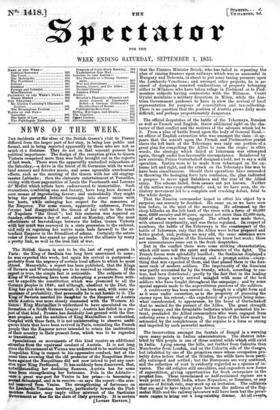The British Queen is not to be the last of
royal guests in Paris: the Xing of Sardinia has long been announced to come ; he was expected this week, but again his arrival is postponed— probably from the urgency of certain local affairs to which he must attend. Meanwhile a report has been published, that the Kings Of Bavaria and Wuriemberg are to be received as visitors. If the wort is true the simple fact is noticeable. The subjects of the Xing of Wuriemberg have been attempting a pressure from with- out to expedite the constitution which was yromised to all the German peoples in 1848; and although, obedient to the Diet, the King has put down the movement, it has been said, with some ap- eMee of probability, that personally he is not hostile to it. The te
'Xing of Bavaria married his daughter to the Emperor of Austria while Austria was more closely connected with the Western Al- 'knee Xing Maximilian is understood to have speculated on the formation of a South German League ; Austria has failed in a pro- ject- of that kind ; Prussia has decidedly lost ground with the Ger- man peoples; and the ambition of King Maximilian is undoubted.
• Coupled with these facts, it is not uninteresting to observe ambi- guous hints that have been revived in Paris, reminding the French people that the Emperor never intended to retain the institutions of their country in their present form, which was to be regarded as transitional.
Speculations on movements of this kind receive an additional 'stimulus from the equivocal conduct of Austria. It is not long since the Government at Vienna was understood to be cautioning the Neapolitan King in respect to his oppressive conduct, but at the same time avowing that the old protector of the Neapolitan Bour- bons against the Neapolitans did not now intend to put any coer- cion npon Xing Ferdinand. It has suddenly been discovered, that, notwithstanding her declining finances, Austria has for some OM" been strengthening her fortresses. Pole in the Adriatic— once, a great war-port for Venice in her prime—is becoming a mo0114 Sebastopol, and is to receive—so says the report—the arse- nal ransoved from Venice. The strengthening of fortresses on the tOmbardo-_Venetian territory, particularly towards the Pied- 111°11te,la frontier, may imply either mistrust of the Sardinian Oovernatent or fear for the state of Italy generally. It is certain
' that the Finance Minister Briick, who has failed in repeating the plan of raising finances upon railways which was so successful in Hungary and Bohemia, is about to put some taxing pressure upon. the Lombardo-Venetians ; and amongst other projects, he is ac- cused of designing renewed confiscations of property belonging either to Milanese who have taken refuge in Piedmont or to Pied- montese subjects having connexions with the Milanese. Count Gyulai maintains a military despotism in Milan, while the Aus- trian Government professes to have in view the revival of local representation for purposes of consultation and tax-collecting. There is no question that the position of Austria grows daily more difficult, and perhaps proportionately dangerous.


























